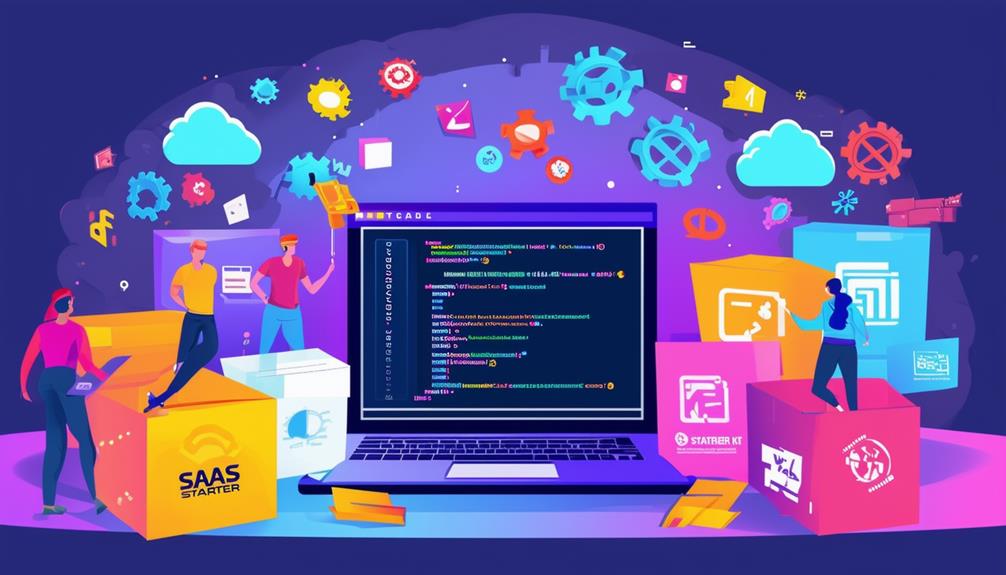As a developer, you’re always looking for ways to streamline your workflow and get products to market faster. That’s where SaaS starter kits come in. These powerful tools can slash your development time and costs by up to 60%, allowing you to focus on what really matters: creating unique features that set your product apart. With pre-built components and best practices baked in, you’ll avoid common pitfalls and build a scalable, secure foundation for your application. But that’s just the tip of the iceberg when it comes to the benefits of SaaS starter kits. There’s much more to explore about how they can revolutionize your development process.
Time and Cost Efficiency
When it comes to developing SaaS applications, starter kits can greatly reduce your time-to-market and development costs. These pre-built frameworks offer a significant head start, allowing you to focus on your unique features rather than reinventing the wheel.
Studies show that using a SaaS starter kit can cut development time by up to 40%. This translates to substantial cost savings, as you’ll need fewer developer hours to launch your product. You’ll also benefit from reduced debugging time, as these kits often come with tried-and-tested components.
Moreover, starter kits typically include essential features like user authentication, payment integration, and basic UI elements. By leveraging these pre-built modules, you’re not just saving time but also ensuring a more robust and secure foundation for your SaaS application.
The cost efficiency extends beyond initial development. Many starter kits are designed with scalability in mind, meaning you won’t need to overhaul your infrastructure as your user base grows. This foresight can save you significant resources in the long run.
Accelerated Development Process
SaaS starter kits turbocharge your development process, allowing you to hit the ground running with pre-built components and structures. These kits greatly reduce the time it takes to launch your product, with studies showing up to a 60% decrease in development time compared to building from scratch.
You’ll benefit from a streamlined workflow, as starter kits often include essential features like user authentication, payment integration, and basic CRUD operations. This means you can focus on developing your unique value proposition rather than reinventing the wheel. Additionally, many kits come with best practices baked in, ensuring your project adheres to industry standards from the get-go.
The accelerated development process also allows for faster iteration. You can quickly deploy a minimum viable product (MVP) and gather user feedback, making necessary adjustments on the fly. This agility is vital in the fast-paced SaaS market, where being first to market can be a considerable advantage.
Built-in Best Practices
One of the most valuable aspects of SaaS starter kits is their incorporation of industry-standard best practices, saving you from common pitfalls and ensuring your project starts on solid footing. These kits are designed by experienced developers who’ve learned from countless projects, distilling their knowledge into a cohesive package.
You’ll find that SaaS starter kits often include robust security measures, such as encryption protocols and authentication systems. According to a 2022 IBM report, the average cost of a data breach is $4.35 million, making these built-in security features vital for your project’s success and reputation.
Additionally, these kits typically implement scalable architecture patterns, allowing your application to grow seamlessly as your user base expands. They often incorporate modern development practices like continuous integration and deployment (CI/CD), which can increase deployment frequency by up to 208%, according to the 2021 State of DevOps Report.
Moreover, SaaS starter kits usually come with optimized database schemas and efficient caching mechanisms, ensuring your application performs well from day one. By leveraging these best practices, you’re not just saving time; you’re setting yourself up for long-term success in the competitive SaaS landscape.
Scalability and Flexibility
How can you guarantee your SaaS project won’t buckle under the weight of success? That’s where the scalability and flexibility of SaaS starter kits come into play. These kits are designed to grow with your business, ensuring you’re prepared for rapid user growth and increasing demands.
Scalability is built into the architecture of quality SaaS starter kits. They often incorporate cloud-native technologies and microservices, allowing you to easily scale specific components as needed. This means you can handle traffic spikes and expanding user bases without overhauling your entire system.
Flexibility is equally essential. SaaS starter kits typically offer modular structures, allowing you to add, remove, or modify features as your business evolves. This adaptability is critical in the fast-paced SaaS market, where user needs and industry trends can shift rapidly.
According to a recent survey, 78% of developers reported that using a scalable starter kit reduced their time-to-market by an average of 40%. Furthermore, 65% found it easier to pivot their product offerings when using a flexible kit.
Focus on Core Features
While scalability and flexibility set the stage for growth, the real power of SaaS starter kits lies in their ability to let you zero in on what truly matters: your core features.
By providing pre-built components for common functionalities, these kits free up your time and resources to focus on developing unique, value-adding features that set your product apart.
Studies show that 80% of a SaaS product’s value comes from just 20% of its features. With a starter kit, you’re not reinventing the wheel for basic elements like user authentication or payment processing.
Instead, you can dedicate your efforts to perfecting those critical 20% of features that’ll make your product stand out in the market.
This focused approach isn’t just about efficiency; it’s about competitive advantage. By concentrating on core features, you’re more likely to create a product that resonates with your target audience.
Data indicates that SaaS companies that prioritize their unique selling points are 63% more likely to achieve product-market fit within their first year.
Competitive Edge in Market
SaaS starter kits consistently give developers a competitive edge in the market by accelerating time-to-market and reducing initial development costs. By leveraging these pre-built foundations, you’re able to launch your product faster than competitors who start from scratch. According to a recent study, developers using starter kits can reduce development time by up to 40%, allowing you to capture market share earlier.
Moreover, these kits often incorporate industry best practices and proven architectures, ensuring your product is built on a solid foundation. This not only enhances the quality of your offering but also improves user experience, leading to higher customer satisfaction and retention rates. Data shows that SaaS products built with starter kits have a 25% lower churn rate in the first year compared to those built from the ground up.
Additionally, starter kits free up your resources to focus on unique features that set your product apart. This allows you to innovate and differentiate your offering more effectively. By allocating more time and budget to developing proprietary features, you’re better positioned to carve out a niche in the competitive SaaS landscape.
To Wrap Up
You can’t afford to overlook SaaS starter kits in today’s competitive landscape. They’ll save you time, money, and headaches while giving you a solid foundation to build on.
With pre-built components and best practices baked in, you’re free to focus on what really matters: creating unique features that set you apart.
Don’t reinvent the wheel – leverage these kits to accelerate your development, scale effortlessly, and get to market faster.






